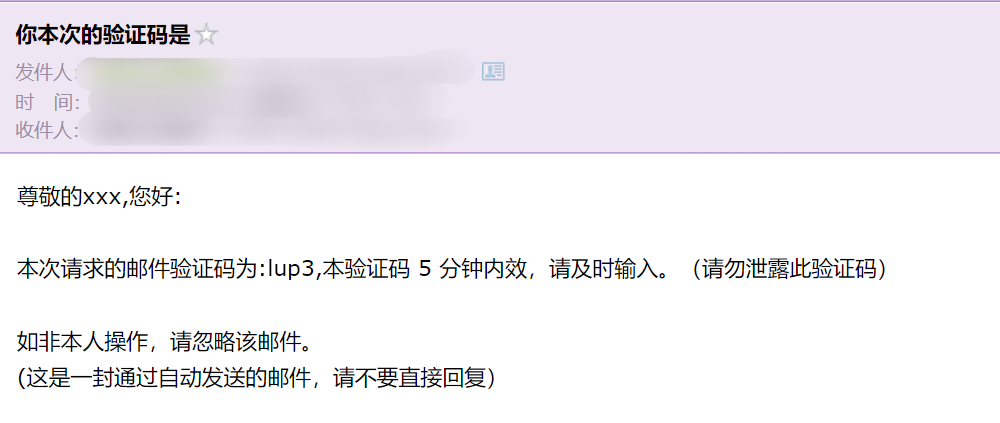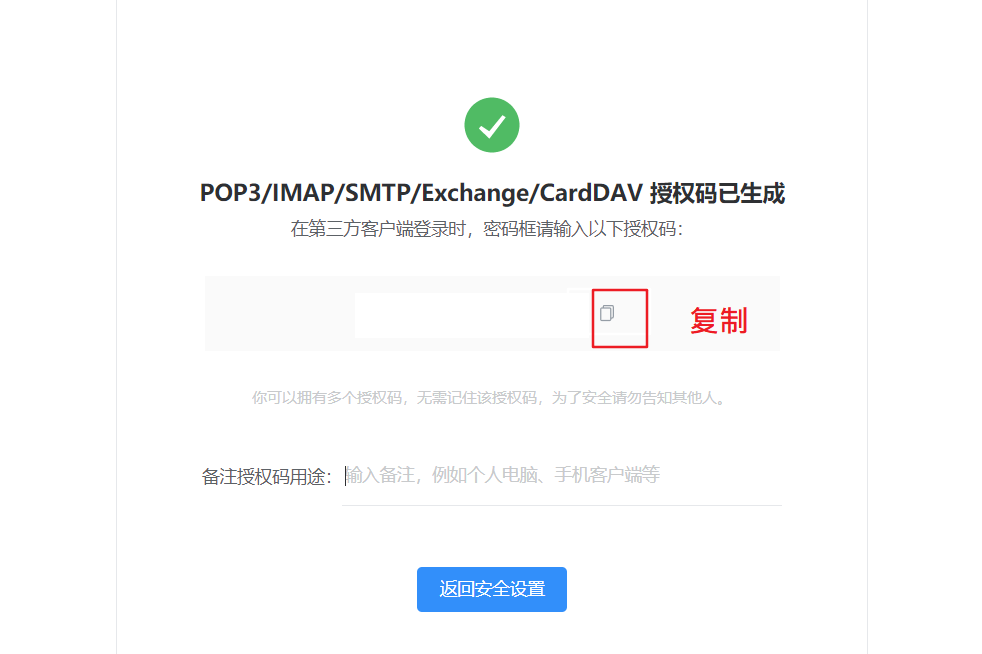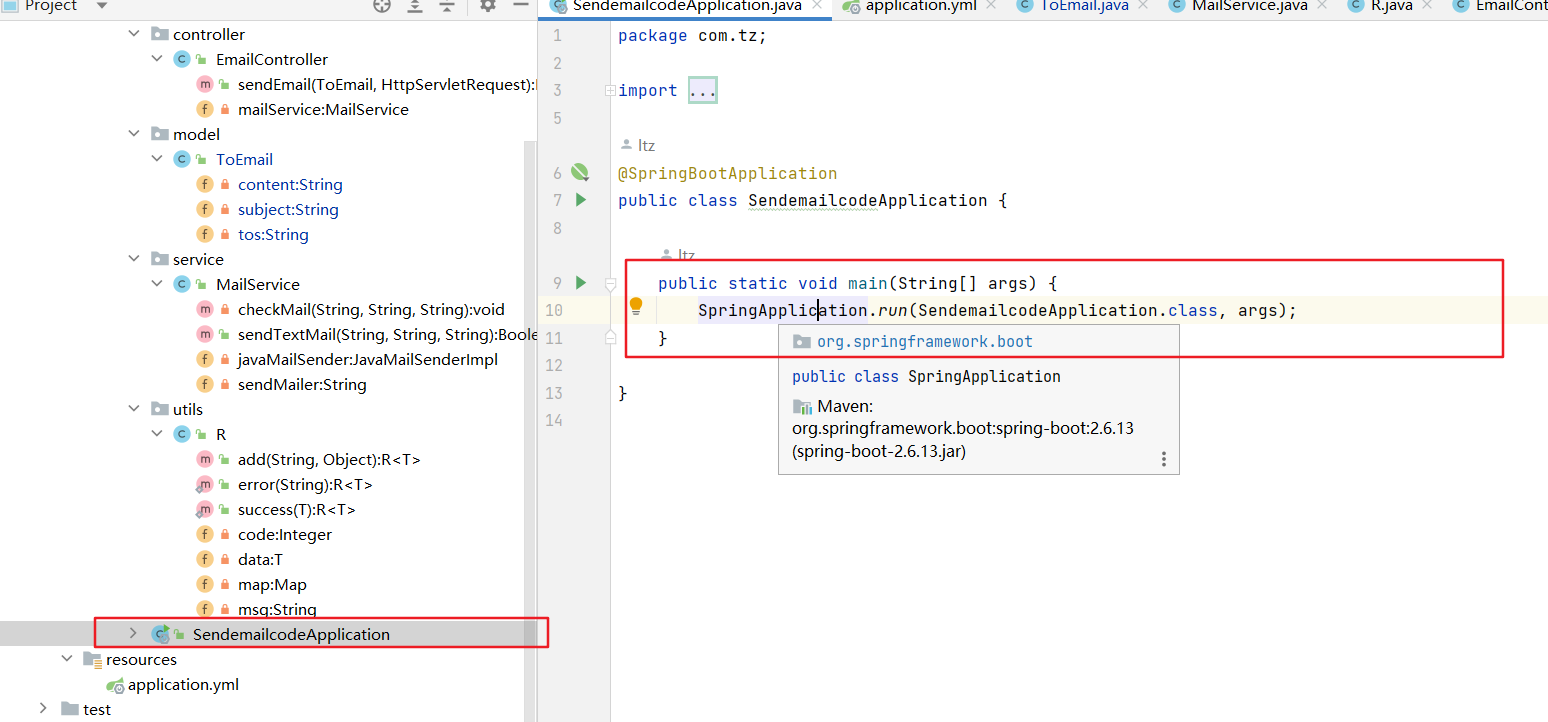-
SpringBoot整合QQ邮箱发送验证码
1.项目介绍
基于SpringBoot + QQ邮箱服务 + Hutools实现的获取验证码功能,接下来从如何申请授权码,如何配置项目,如何启动项目,如何测试项目进行讲解,下面的图片是一个测试案例,使用postman进行测试,在测试上填写发送人的邮箱,即可收到验证码邮箱

2.使用前提
1.从仓库拉取代码
2.需要申请邮箱的授权码,然后在application.yml下进行配置
3.邮箱授权码申请
1.开启POP3/SMTP服务

点击设置,进入下面的页面,然后再点击账号

往下滑,找到下面的服务,点击申请授权码,按照提示一步步完成

2.复制授权码

4.项目使用说明
1.可以自己手写代码,也可以从我的仓库直接拉取代码
2.配置application配置文件,修改username改为自己的邮箱,password改为邮箱授权码,详细介绍查看代码说明下的配置文件
3.启动项目SendemailcodeApplication
4.使用postman进行测试
1.拉取仓库代码:
git clone https://gitee.com/tzmoxi/use-email-getcode.git- 1
2.修改配置文件
修改application.yml下的配置文件,修改成为自己的邮箱和授权码

3.修改完成上面的内容,就直接启动项目

4.使用postman测试
首先是get请求,填写请求地址localhost:8080/user/getCode,传递的参数为tos值为接收方邮箱,点击发送即可收到

点击发送,成功后,邮箱会收到一个验证码

5.代码说明
1.创建一个SpringBoot工程
2.引入邮件相关依赖
注意:springboot相关的依赖给去掉了,在创建工程的时候会自动引入
<dependencies> <dependency> <groupId>org.projectlombokgroupId> <artifactId>lombokartifactId> <version>1.18.24version> <scope>providedscope> dependency> <dependency> <groupId>cn.hutoolgroupId> <artifactId>hutool-allartifactId> <version>5.8.16version> dependency> <dependency> <groupId>org.springframework.bootgroupId> <artifactId>spring-boot-starter-mailartifactId> dependency> <dependency> <groupId>org.apache.commonsgroupId> <artifactId>commons-lang3artifactId> <version>3.12.0version> dependency> <dependency> <groupId>com.mysqlgroupId> <artifactId>mysql-connector-jartifactId> <scope>runtimescope> dependency> dependencies>- 1
- 2
- 3
- 4
- 5
- 6
- 7
- 8
- 9
- 10
- 11
- 12
- 13
- 14
- 15
- 16
- 17
- 18
- 19
- 20
- 21
- 22
- 23
- 24
- 25
- 26
- 27
- 28
- 29
- 30
- 31
- 32
- 33
- 34
- 35
- 36
3.配置application.yml文件
username和password需要使用自己的
username事自己的qq邮箱
password是刚昂申请的邮箱授权码
Spring: # 邮箱基本配置 mail: host: smtp.qq.com # 填写自己的邮箱 username: 111111111111@qq.com # 在邮箱内填写自己申请的授权码 password: aaaaaaaaaaaa # 端口号 port: 587 # 默认的邮件编码为UTF-8 default-encoding: UTF-8 # 其他参数 properties: mail: # 配置SSL 加密工厂 smtp: ssl: # 本地测试, 先放开ssl enable: false required: false #开启debug模式,这样邮件发送过程的日志会在控制台打印出来,方便排查错误 debug: false server: port: 8080- 1
- 2
- 3
- 4
- 5
- 6
- 7
- 8
- 9
- 10
- 11
- 12
- 13
- 14
- 15
- 16
- 17
- 18
- 19
- 20
- 21
- 22
- 23
- 24
- 25
4.定义实体类
@Data @AllArgsConstructor public class ToEmail implements Serializable { //邮件接受方 private String tos; //邮件主题 private String subject; //邮件内容 private String content; }- 1
- 2
- 3
- 4
- 5
- 6
- 7
- 8
- 9
- 10
- 11
- 12
- 13
- 14
- 15
- 16
- 17
5.邮件服务也是核心
public class MailService { /** * 注入邮件工具类 */ @Resource private JavaMailSenderImpl javaMailSender; @Value("${spring.mail.username}") private String sendMailer; /** * 检测邮件信息类 * @param receiveEmail 接收者 * @param subject 主题 * @param emailMsg 内容 */ private void checkMail(String receiveEmail, String subject, String emailMsg){ // StringUtils 需要引入 commons-lang3 依赖 // 可以用 receiveEmail == null || receiveEmail.isEmpty() 来代替 if(StringUtils.isEmpty(receiveEmail)) { throw new RuntimeException("邮件收件人不能为空"); } if(StringUtils.isEmpty(subject)) { throw new RuntimeException("邮件主题不能为空"); } if(StringUtils.isEmpty(emailMsg)) { throw new RuntimeException("邮件内容不能为空"); } } /** * 发送纯文本邮件 * @param receiveEmail 接收者 * @param subject 主题 * @param emailMsg 内容 */ public Boolean sendTextMail(String receiveEmail, String subject, String emailMsg) { // 参数检查 checkMail(receiveEmail, subject, emailMsg); try { // true 代表支持复杂的类型 MimeMessageHelper mimeMessageHelper = new MimeMessageHelper(javaMailSender.createMimeMessage(), true); // 邮件发件人 mimeMessageHelper.setFrom(sendMailer); // 邮件收件人 mimeMessageHelper.setTo(receiveEmail.split(",")); // 邮件主题 mimeMessageHelper.setSubject(subject); // 邮件内容 mimeMessageHelper.setText(emailMsg); // 邮件发送时间 mimeMessageHelper.setSentDate(new Date()); // 发送邮件 javaMailSender.send(mimeMessageHelper.getMimeMessage()); System.out.println("发送邮件成功: " + sendMailer + "-->" + receiveEmail); return true; } catch (MessagingException e) { e.printStackTrace(); System.out.println("发送邮件失败: " + e.getMessage()); return false; } } }- 1
- 2
- 3
- 4
- 5
- 6
- 7
- 8
- 9
- 10
- 11
- 12
- 13
- 14
- 15
- 16
- 17
- 18
- 19
- 20
- 21
- 22
- 23
- 24
- 25
- 26
- 27
- 28
- 29
- 30
- 31
- 32
- 33
- 34
- 35
- 36
- 37
- 38
- 39
- 40
- 41
- 42
- 43
- 44
- 45
- 46
- 47
- 48
- 49
- 50
- 51
- 52
- 53
- 54
- 55
- 56
- 57
- 58
- 59
- 60
- 61
- 62
- 63
- 64
6.编写控制层
@RestController @RequestMapping("/user") public class EmailController { @Resource private MailService mailService; @RequestMapping("/getCode") public R sendEmail(ToEmail toEmail, HttpServletRequest request) { if(toEmail == null || toEmail.getTos() == null ) { return R.error( "参数错误!"); } toEmail.setSubject("你本次的验证码是"); // 使用hutools工具获取验证码 CircleCaptcha captcha = CaptchaUtil.createCircleCaptcha(200, 100, 4, 20); String verCode = captcha.getCode(); String content = "尊敬的xxx,您好:\n" + "\n本次请求的邮件验证码为:" + verCode + ",本验证码 5 分钟内效,请及时输入。(请勿泄露此验证码)\n" + "\n如非本人操作,请忽略该邮件。\n(这是一封通过自动发送的邮件,请不要直接回复)"; toEmail.setContent(content); Boolean check = mailService.sendTextMail(toEmail.getTos(), toEmail.getSubject(), toEmail.getContent()); if(check) { return R.success("发送成功"); } else { return R.error( "发送失败"); } } }- 1
- 2
- 3
- 4
- 5
- 6
- 7
- 8
- 9
- 10
- 11
- 12
- 13
- 14
- 15
- 16
- 17
- 18
- 19
- 20
- 21
- 22
- 23
- 24
- 25
- 26
- 27
- 28
- 29
- 30
6.Git仓库地址
-
相关阅读:
eNsp使用技巧
Python1 文件读写操作
归并排序的经典-求逆序对
70. 爬楼梯
11、将数组中的 0 移动到末尾
实用篇 | 做自己的管理系统 :Pycharm+django+mysql
Effective C++ 学习笔记 条款19 设计class犹如设计type
css齿轮转动效果
单例模式(饿汉式和懒汉式 )(简洁版)(Java)
备战蓝桥杯---图论应用1
- 原文地址:https://blog.csdn.net/qq_52699757/article/details/133284366
